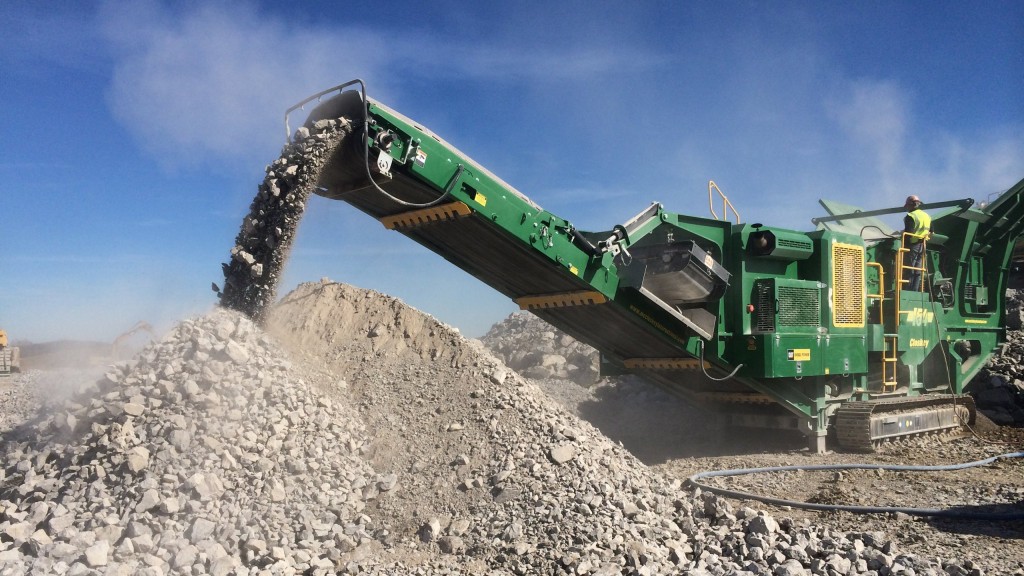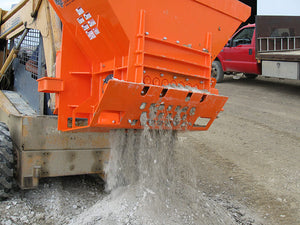Concrete Crushing Proficiency: The Art of Picking Concrete Crusher for Sale
Concrete Crushing Proficiency: The Art of Picking Concrete Crusher for Sale
Blog Article
Making The Most Of Sustainability: The Function of Concrete Crushers in Recycling
Concrete waste is a prevalent ecological concern, with the construction industry being one of the largest factors to global carbon emissions. By using the power of innovative modern technology, concrete crushers supply a myriad of benefits that not only lower waste however additionally save all-natural sources and mitigate the ecological effect of construction projects. In this discussion, we will certainly explore how concrete crushers work, highlight the advantages of recycling concrete, display effective situation studies, and give a look right into the future of this evolving area.
The Environmental Effect of Concrete Waste
The environmental effect of concrete waste is a considerable problem in the realm of recycling and sustainable building and construction techniques. Concrete is among one of the most extensively made use of construction products due to its stamina and longevity. Nonetheless, its manufacturing and disposal add to numerous ecological problems. The extraction of resources, such as sedimentary rock and clay, for concrete manufacturing brings about habitat destruction and biodiversity loss. Furthermore, the manufacturing process itself is energy-intensive and launches a considerable amount of carbon dioxide into the atmosphere, adding to environment modification.
The disposal of concrete waste likewise poses ecological obstacles. When concrete is demolished or removed from building and construction websites, it is typically sent out to landfills, occupying important room and producing greenhouse gas discharges as it disintegrates. The incorrect disposal of concrete waste can contaminate dirt and water sources, affecting communities and human health.
To address these environmental problems, reusing concrete waste has actually come to be a necessary technique in the building sector. Concrete crushers play a vital role in this procedure by breaking down concrete waste into smaller sized, recyclable bits. These crushed particles can then be used as accumulations in brand-new concrete manufacturing, decreasing the requirement for virgin products. Reusing concrete waste not just preserves natural deposits but likewise lowers carbon emissions linked with concrete production.
Just How Concrete Crushers Work
Concrete crushers are effective machines created to break down concrete waste into smaller bits for recycling purposes. These devices use hydraulic pressure and huge jaws to put in pressure on concrete waste, squashing it right into smaller items that can be recycled as accumulations in new building and construction tasks.
The process of how concrete crushers function starts with the feeding of the concrete waste right into the crusher's hopper. The hopper, which is commonly furnished with a shaking feeder, guarantees a regular and also circulation of product right into the crusher.
Once inside the crusher, the concrete waste undergoes the squashing action of the device's jaws. These jaws, which are typically constructed from solid and resilient products like manganese steel, put in remarkable force on the concrete waste, simplifying into smaller, more workable pieces.
The smashed concrete waste then goes through a series of screens or filters, which sort the accumulation by dimension (concrete crusher for sale). This enables the separation of bigger items that might require more squashing from smaller, ready-to-use accumulations

Benefits of Recycling Concrete With Crushers
Reusing concrete waste with the aid of crushers offers many advantages towards lasting building techniques and source conservation. Among the essential benefits of reusing concrete is that it helps in reducing the need for brand-new building and construction products. By utilizing crushed concrete as a replacement for natural aggregates, such as crushed rock and sand, we can reduce the need for quarrying and extracting tasks. Read More Here This, in turn, helps preserve natural deposits and decreases the environmental influence connected with removing and processing virgin materials.
One more significant benefit of reusing concrete is the decrease in landfill waste. Concrete waste uses up a substantial amount of room in garbage dumps, and its disposal can add to contamination and greenhouse gas emissions. concrete crusher for sale. By reusing concrete, we can divert this waste from land fills and minimize the pressure on these currently restricted resources. Additionally, recycling concrete can help in reducing transport expenses and carbon emissions connected with hauling waste material to land fills.
In addition, making use of recycled concrete can result in cost financial savings in construction jobs. Crushed concrete is commonly less costly than utilizing brand-new products, making it an attractive choice for programmers and specialists. Reusing concrete can also contribute to LEED (Leadership in Energy and Environmental Style) qualification, which is a widely acknowledged standard for sustainable structure techniques.
Instance Studies: Effective Concrete Recycling Projects
Several noteworthy situation research studies exemplify the success of concrete recycling projects in various construction and framework advancements. One such study is the Central Artery/Tunnel Task, also referred to as the "Large Dig," in Boston, Massachusetts. The task included the construction of a brand-new below ground highway system, which called for the demolition of existing concrete frameworks. By executing a concrete crusher on-site, the project had the ability to recycle and reuse roughly 98% of the demolished concrete, causing significant price savings and minimized ecological influence.
One more successful situation research study is the Sydney Metro Northwest job in Australia. This significant facilities development included the construction of a brand-new metro rail line. To decrease the job's carbon impact and advertise sustainability, concrete crushers were used to reuse the knocked down concrete from old structures and structures. This strategy not only saved landfill space however likewise led to significant material cost savings and lowered transportation prices.
Furthermore, the Los Angeles International Flight Terminal (LAX) expansion job integrated concrete recycling as an essential part of its sustainability efforts. By utilizing crushers to process and recycle the demolished concrete, the project had the ability to divert countless lots of waste from land fills and lower the demand for virgin accumulation. This not just lessened environmental influence but also assisted the task achieve LEED qualification.
These case research studies demonstrate the efficiency of concrete crushers in taking full advantage of sustainability and promoting the circular economic climate in building and framework projects. By accepting concrete recycling, designers can reduce waste, save sources, and add to a much more lasting future.
Future Technologies in Concrete Crushing Innovation

One of the future advancements in concrete crushing innovation is the development of robot crushers. These crushers will be furnished with advanced sensors and artificial knowledge capabilities, enabling them to autonomously identify and separate various materials in knocked down concrete. This will significantly reduce the need for hand-operated sorting, conserving time and more resources.
An additional area of technology is making use of advanced crushing methods that can extract a greater percentage of aggregates from demolished concrete. Currently, a considerable quantity of accumulations are lost during the squashing procedure. Nevertheless, with the other development of new squashing innovations, it is prepared for that the recovery rate of aggregates will certainly boost, bring about a much more efficient and lasting recycling procedure.
Additionally, scientists are checking out the usage of different power resources to power concrete crushers. By making use of renewable resource, such as solar or wind power, the carbon impact of the squashing process can be more reduced, contributing to a greener and much more lasting building and construction market.
Verdict
In conclusion, concrete crushers play an essential function in maximizing sustainability with the recycling of concrete waste. By minimizing the ecological impact of concrete waste and advertising the reuse of materials, crushers add to a much more lasting building and construction industry.
Concrete crushers play an important role in this process by breaking down concrete waste into smaller, reusable particles. Recycling concrete waste not only saves all-natural resources but also reduces carbon emissions associated with concrete production.
By implementing a concrete crusher on-site, the project was able to reuse and reuse about 98% of the knocked down concrete, resulting in considerable expense financial savings and lowered ecological influence.
To lower the task's carbon footprint and promote sustainability, concrete crushers were made use of to recycle the destroyed concrete from old buildings and frameworks (concrete crusher for sale).In conclusion, concrete crushers play a vital duty in making the most of sustainability through the recycling of concrete waste
Report this page